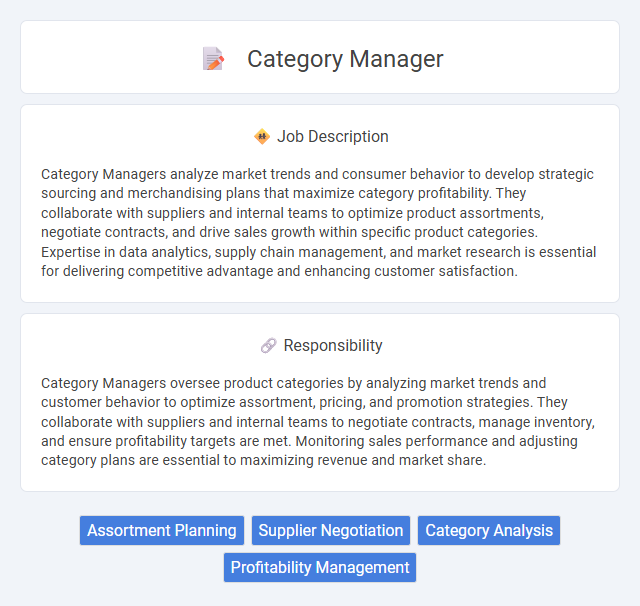
Category Managers analyze market trends and consumer behavior to develop strategic sourcing and merchandising plans that maximize category profitability. They collaborate with suppliers and internal teams to optimize product assortments, negotiate contracts, and drive sales growth within specific product categories. Expertise in data analytics, supply chain management, and market research is essential for delivering competitive advantage and enhancing customer satisfaction.
People who are detail-oriented and possess strong analytical skills are likely to be suitable for a Category Manager role, as it often involves managing product categories and making data-driven decisions. Those comfortable with negotiation and cross-functional collaboration may find this job aligns well with their strengths. Candidates who struggle with multitasking or lack strategic thinking might find it challenging to thrive in this position.
Qualification
A Category Manager typically holds a bachelor's degree in business administration, marketing, or supply chain management, with preferred certifications such as CPM (Certified Professional Manager) or CSCP (Certified Supply Chain Professional). Proven experience in category management, data analysis, and strategic sourcing is essential, alongside strong negotiation and vendor management skills. Expertise in market research, financial analysis, and project management tools enhances effectiveness in optimizing product categories and driving profitability.
Responsibility
Category Managers oversee product categories by analyzing market trends and customer behavior to optimize assortment, pricing, and promotion strategies. They collaborate with suppliers and internal teams to negotiate contracts, manage inventory, and ensure profitability targets are met. Monitoring sales performance and adjusting category plans are essential to maximizing revenue and market share.
Benefit
Category Manager roles likely enhance supply chain efficiency and drive revenue growth by optimizing product assortments. They probably improve vendor relationships, leading to better pricing and exclusive deals. This position might also offer strategic influence and career advancement opportunities within retail or procurement sectors.
Challenge
A Category Manager likely faces the challenge of balancing supplier relationships with consumer demand while optimizing product assortments for profitability. Managing cross-functional teams to implement effective category strategies may require navigating conflicting priorities and market fluctuations. Staying ahead in a rapidly changing retail environment could demand continuous adaptation and data-driven decision-making skills.
Career Advancement
A Category Manager role offers significant career advancement opportunities through strategic responsibility for product assortment, pricing, and supplier negotiations. Mastery in data analysis and market trends enhances decision-making skills, positioning professionals for senior roles such as Senior Category Manager or Head of Category Management. Continuous upskilling in digital tools and leadership is essential to drive growth and secure executive-level positions within retail or manufacturing organizations.
Key Terms
Assortment Planning
Category Managers specialize in assortment planning by analyzing market trends and consumer behavior to optimize product mix and maximize sales. They collaborate closely with suppliers and cross-functional teams to ensure the right balance of inventory that meets demand while minimizing excess stock. Effective assortment planning improves profitability by aligning product offerings with target customer preferences and seasonal variations.
Supplier Negotiation
Category Managers excel in supplier negotiation by leveraging market analysis and strategic sourcing techniques to secure favorable terms and pricing. They analyze supplier performance data and contract compliance to optimize cost efficiency and supply chain reliability. Effective negotiation skills enable Category Managers to build strong vendor relationships and drive continuous value improvement for their organization.
Category Analysis
Category Managers leverage advanced category analysis techniques to optimize product assortments and pricing strategies, driving increased profitability and market share. Utilizing data analytics tools, they identify consumer trends, sales patterns, and competitive dynamics to make informed decisions on inventory management and promotional activities. Effective category analysis enables Category Managers to enhance supplier negotiations and align product categories with business objectives.
Profitability Management
Category Managers drive profitability management by analyzing sales data, market trends, and consumer behavior to optimize product assortment and pricing strategies. They collaborate with suppliers and cross-functional teams to negotiate margins, reduce costs, and enhance category performance. Effective profitability management enables Category Managers to maximize revenue while maintaining competitive market positioning.
 kuljobs.com
kuljobs.com